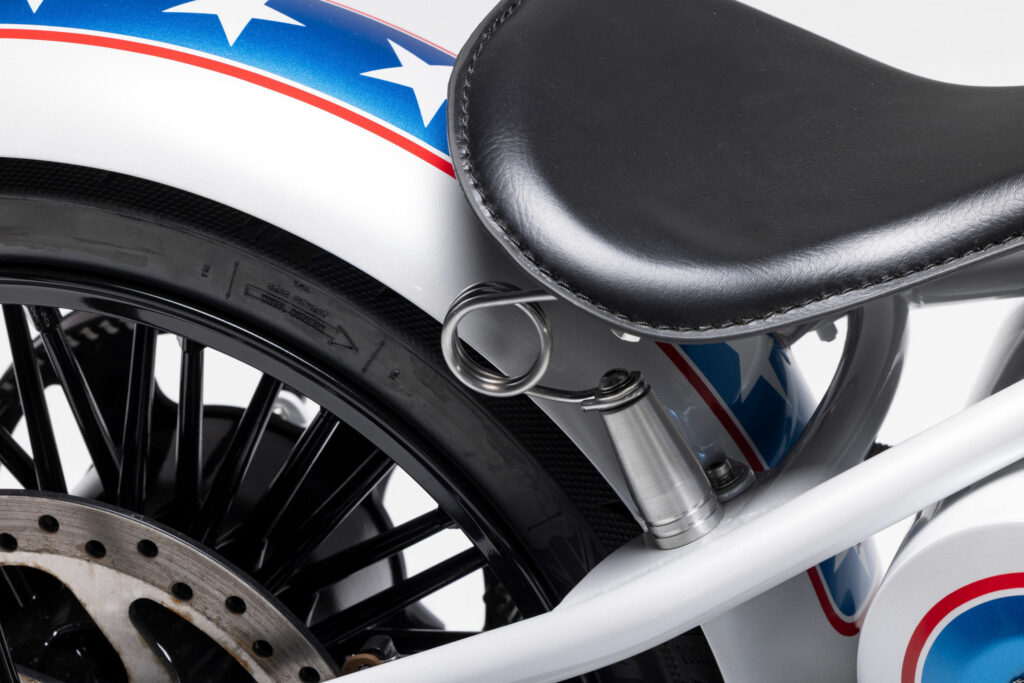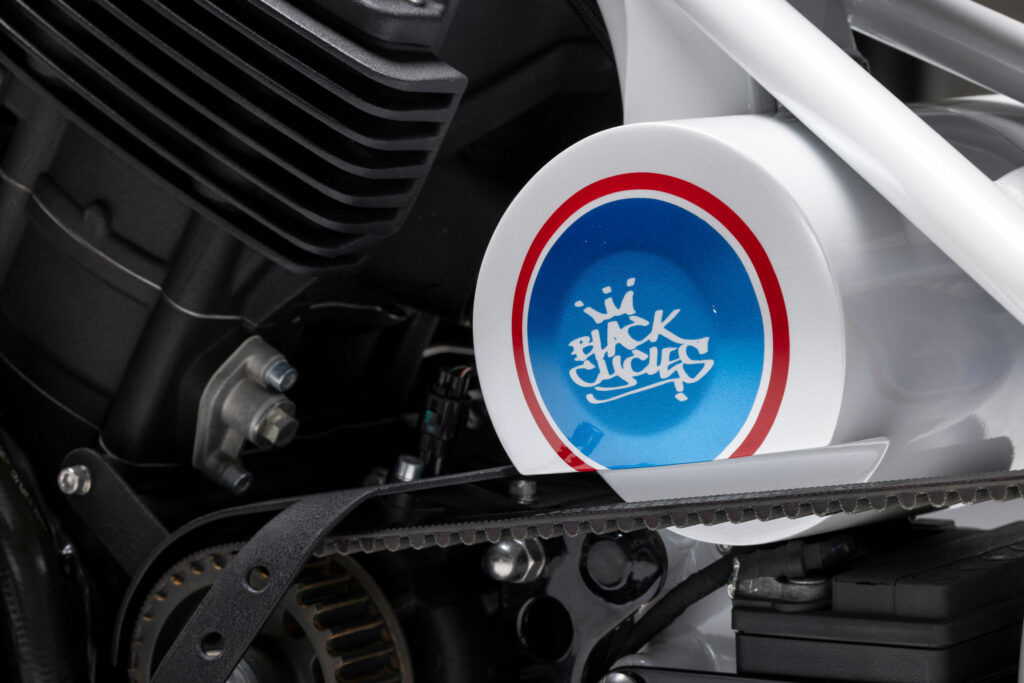
It’s been ten years since Harley-Davidson showed up at EICMA 2013 to show off the Street XG range and announce that the big US company was here to take on the small bike market. But through no real fault of the machine itself, the Street just never really took off. It was being hammered in the US press before its specifications were even known and that was always going to hurt sales figures. So, this year HD announced the introduction of their new X series – a true small bike for the masses – but the Street still has plenty of potential in the right hands. And few do it better than Noel Muller of Black Cycles Australia who took an interesting call from a previous customer. Could he build for that gentleman’s brother the ultimate Christmas present for the street? And the answer is staring back at you in all of its star-spangled glory.

“A couple of months ago a previous customer, Jacob contacted me about building a near new Harley Davidson Street 500 up as a Christmas present for his brother. Jacob already had the Street 500 with only 350kms on the clock,” Noel tells us. First, we have to say, why isn’t every brother like Jacob? And such a low mileage donor was also an excellent way to start, saving those build dollars for where it matters most and not chasing endless mechanical gremlins. There isn’t much Noel can’t do, very little in fact, so Jacob gave him his wish list which included a rigid rear, big spoked wheels, clip-on bars, a sporty tank and a rough idea for the paint scheme.

The rear end and the factory guard for the radiator are two areas that many builders struggle with, so Noel quickly had both off, with the guard thrown out and the grinder doing the work to rid the little Harley of its swingarm and twin shock setup. Speaking to Noel he makes it sound easy, but his work on turning the frame rigid is absolutely beautiful. The lines flow effortlessly to the rear axle, dropping the rear to the deck and being perfectly integrated with the rest of the factory frame. The welds are simply stunning and the way everything is gusseted and reinforced means you get form and function in equal measure.

Now to sort the wheels, “I actually found some one-piece cast alloy wheels based on fat spoke wheels. These are around 6kg lighter & tubeless. They are to fit Harley big twins so the rear cush drive wheel actually bolted up with just new spacers required. The front was another story. Too wide for the front end it needed some serious machining to even get close to sliding in, but still wasn’t enough so the original trees have been widened 22mm.” Then the axle was modified, some spacers for the wheel and brake machined and it all fit like a glove, and there is simply no arguing with the incredible result.

To form the fenders, Noel was able to modify the factory item to fit over the 21in front wheel and follow the lines of the tyre beautifully. For the rear, an aftermarket piece was required but still needed some massaging to get it over the wide 18in rim.

“To mount a Sportster fuel tank to one of these usually means widening it by nearly 3” because of the wide backbone & fuel pump, but I decided this time to heavily modify the fuel pump (to narrow it) & build a new tunnel to suit! So it remains the original outside dimensions.” Noel even fabricated a flush mount pop-up cap and the only downside to the modifications is a reduction in fuel capacity.

The all-important seat fits on with machined mounts and modified springs and then an oil tank was fabricated from scratch, especially for the build, but it doesn’t hold lube. These bikes have a huge bundle of wiring and electrical components to make everything run on the modern machine. “But this time I really wanted it as clean as possible (especially against a white frame) so I of course enlisted the help of Justin from Pop Bang Classics to achieve this & after over 20 hours of work & some help (annoyance) from myself it was a super clean result, especially considering ALL of the original gadgets were retained!”

Then you get all the great touches that Noel is known for; A Motogadget mini gauge is sunk into the upper triple clamp and the clip-on bars are neatly integrated with some upper fork covers. A Bates-style headlight is the absolute perfect match for the look and uses the stock insert. While the rest of the lighting takes advantage of one of Kellermann’s all-in-one rear setups.

The engine gets an upgrade too, with a shaved S&S filter tucking tight against the engine and a Two Brothers Racing full 2 into 1 exhaust system which definitely brings the little V-Twin to life. To improve the handling the forks were lowered 120mm, stiffened & had hydraulic soft stops made by Chris Jones at XXX suspension.

“As for the paint, I personally felt the blue frame/white tins could be even better so with the green light from Jacob to change it around I decided to go with a loose “Evel Knievel’ theme. The frame was painted here in-house in a pearl white, while Justin killed it on the tins once again! You’ll notice the “Harley Davidson” writing on the tank, I chose this simply because Evel signed each one of his bikes so I wanted this to look something like a signature,” Noel explains.

There are a bunch of other bits modified and fitted to complete the build. And what better to find under the Christmas Tree than a Black Cycles custom Harley Street, ready to cruise in style through the Aussie summer.

[ Black Cycles Australia | Photography by Gold Coast Studio ]
